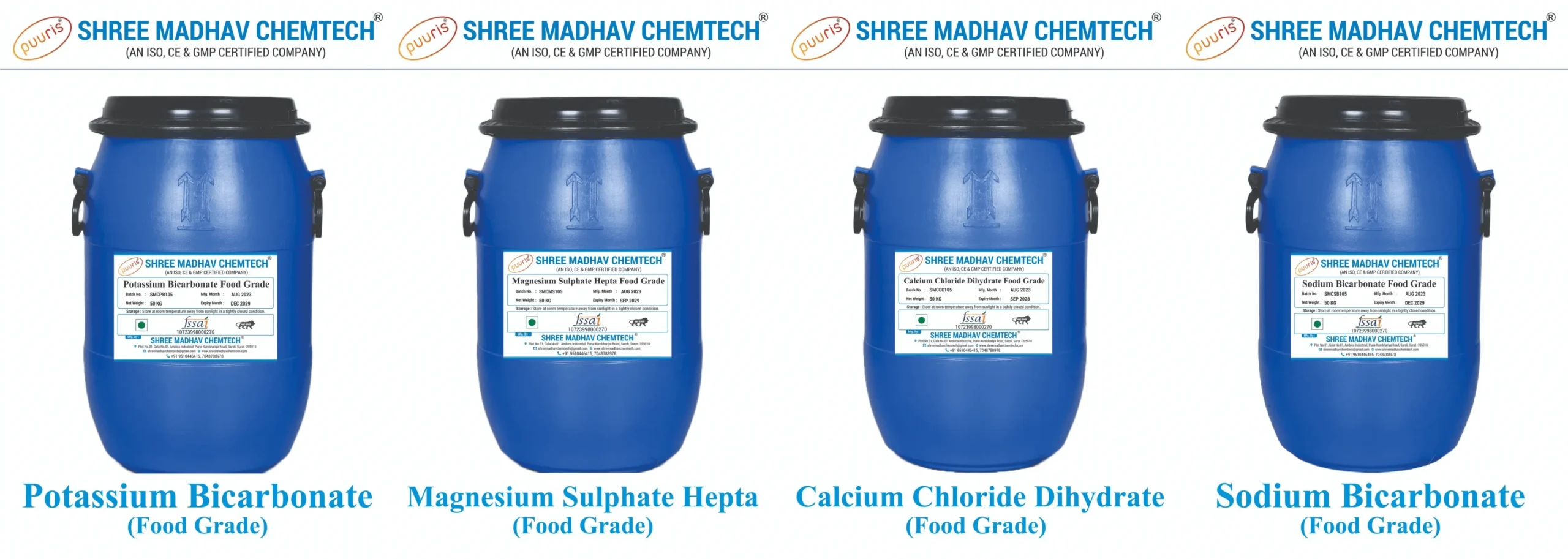ADDED MINERAL CHEMICALS FOR PACKAGED DRINKING WATER :-
SHREE MADHAV CHEMTECH is the leading manufacturer of Added mineral chemicals (potassium bicarbonate ,magnesium sulphate ,calcium chloride and sodium bicarbonate) in India. We specialize in producing high quality Added Mineral Chemicals for packaged drinking water In India.
It is a versatile product with a wide range of applications, making it an essential ingredient in many processes. Our product is approved under Food Safety and Standards authority of India (FSSAI).
Pack Size : 5 kg, 25 kg & 50 kg

Added mineral chemicals (potassium bicarbonate ,magnesium sulphate ,calcium chloride and sodium bicarbonate) for packaged drinking water plant is food-grade minerals used to enhance the taste, quality, and nutritional value of water after purification processes like reverse osmosis (RO), which often strip water of essential Needed minerals. These additives restore minerals, regulate pH, and improve hydration and health benefits in Packaged Drinking Water.
Packaged drinking water often has minerals added to enhance taste, improve hydration, and provide health benefits & Balanced TDS ,PH And Mineral Content as per FSSAI Guidelines.
Calcium Chloride Di-Hydrate : Supports bone health and adds a refreshing taste. Requirement concentrations of Calcium is 10 mg/L as per FSSAI rules.
It is also used to improve the water’s taste and stability,
Magnesium Sulphate Hepta Hydrate :
Magnesium Minerals in packaged drinking water offers several health benefits including supporting cardiovascular and bone health,aiding digestion, and maintaining electrolyte balance. It can help regulate blood pressure and improve heart muscle function, strengthen bones, and prevent muscle spasms.
Requirement concentrations of Magnesium is 05 mg/L as per FSSAI rules.
Potassium Bi Carbonate :
Potassium in packaged drinking water primarily benefits electrolyte balance and hydration. It can also improve the taste of water and when added in higher concentrations, may help with blood pressure regulation, especially for those with hypertension.
Concentrations of potassium is vary but are often lower than calcium or magnesium.
Sodium Bi Carbonates:-
Sodium in packaged drinking water helps with hydration, fluid balance, muscle function, and electrolyte.
Sodium Bicarbonate salts are used in water treatment, including softening, corrosion control, pH adjustment, and coagulation in packaged drinking water.
Benefits of Adding Food Grade Minerals :-
Taste improvement: Minerals like potassium ,calcium, magnesium improve the Taste of water, making water more palatable (e.g. calcium Mineral adds a refreshing taste, magnesium mineral a slight sweetness).
Health Benefits: All of These minerals support essential bodily functions.
Calcium Chloride Di hydrate (Ca): Bone health , muscle function and blood pressure regulation.
Magnesium Sulphate Hepta hydrate (Mg): Muscle and nerve function, heart health, and energy production.
Potassium Bicarbonate (K): Electrolyte balance, hydration, and heart function.
pH Regulation: Added minerals like bicarbonates maintain pH levels (typically 6.5–8.5) to prevent corrosion of pipes and ensure water stability.
Remineralization: RO and other Water Treatment filtration processes remove beneficial minerals from Drinking water so these chemicals are added to restore nutritional value of minerals.
At SHREE MADHAV CHEMTECH we are committed to providing you with high quality product at competitive prices. Contact us today to place your order or to learn more about our product and services.

